

Google Maps now lets you retrace all of your past steps. NSA files decoded: Edward Snowden's surveillance revelations explained. Two factors opened the way for the rapid expansion of surveillance over the past decade: the fear of terrorism created by the 9/11 attacks and the digital revolution that led to an explosion in cell phone and internet use.
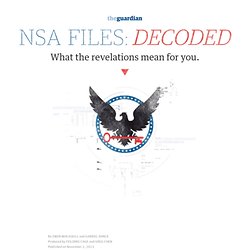
NSA collecting phone records of millions of Verizon customers daily. The National Security Agency is currently collecting the telephone records of millions of US customers of Verizon, one of America's largest telecoms providers, under a top secret court order issued in April.
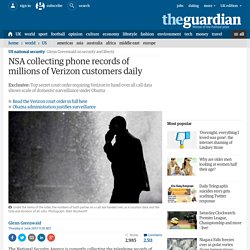
The order, a copy of which has been obtained by the Guardian, requires Verizon on an "ongoing, daily basis" to give the NSA information on all telephone calls in its systems, both within the US and between the US and other countries. The document shows for the first time that under the Obama administration the communication records of millions of US citizens are being collected indiscriminately and in bulk – regardless of whether they are suspected of any wrongdoing. The secret Foreign Intelligence Surveillance Court (Fisa) granted the order to the FBI on April 25, giving the government unlimited authority to obtain the data for a specified three-month period ending on July 19. Edward Snowden: the whistleblower behind the NSA surveillance revelations. The individual responsible for one of the most significant leaks in US political history is Edward Snowden, a 29-year-old former technical assistant for the CIA and current employee of the defence contractor Booz Allen Hamilton.
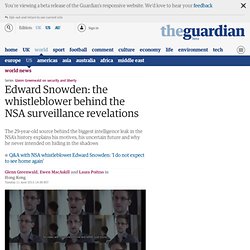
Snowden has been working at the National Security Agency for the last four years as an employee of various outside contractors, including Booz Allen and Dell. The Guardian, after several days of interviews, is revealing his identity at his request. How One Woman Hid Her Pregnancy From Big Data. Here Is EFF's Master Plan for Ending Global Mass Surveillance. Newyorker. President Obama spent only a few moments of his State of the Union this week talking about the National Security Agency and civil liberties.
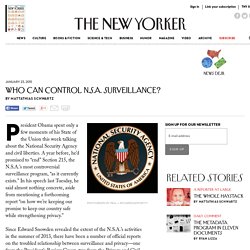
FOIA Documents Reveal Massive DEA Program to Record American’s Whereabouts With License Plate Readers. The Drug Enforcement Administration has initiated a massive national license plate reader program with major civil liberties concerns but disclosed very few details, according to new DEA documents obtained by the ACLU through the Freedom of Information Act.

The DEA is currently operating a National License Plate Recognition initiative that connects DEA license plate readers with those of other law enforcement agencies around the country. A Washington Post headline proclaimed in February 2014 that the Department of Homeland Security had cancelled its “national license-plate tracking plan,” but all that was ended was one Immigrations and Customs Enforcement solicitation for proposals. In fact, a government-run national license plate tracking program already exists, housed within the DEA.
Cyber spying thrives as mankind bids farewell to a private life. WASHINGTON – Eighteen months ago National Security Agency cyber spy Edward Snowden shocked the world when he emerged from the shadows to reveal the biggest government surveillance program mankind has ever known.

By collecting bulk data on phone calls, emails and other social media communications, the U.S. government was essentially monitoring the private lives of pretty well everybody with a phone and/or Internet connection. Americans, Canadians, Europeans, Asians – it didn’t matter. We had all come under suspicion. Boosted by a decades-old intelligence gathering and sharing agreement called the “Five Eyes” – U.S., Canada, Britain, Australia and New Zealand – there was every reason to believe that not only was the U.S. sharing this information with its partners, but also these countries were watching their citizens with similar vigor.
The year we get creeped out by algorithms. It turns out computers have a built-in “uncanny valley” (that creepy feeling android robots generate when they kind of look human).

Just like we don’t want robots too human-shaped — we want them to know their place — it turns out we aren’t too happy when our computers go from “smart” (as in automating things and connecting us to each other or information) to “smart” (as in “let me make that decision for you”). Algorithmic judgment is the uncanny valley of computing. Algorithms (basically computer programs, but here I’m talking about the complex subset that is being used to calculate results of some consequence, which than shape our experience) have become more visible in 2014, and it turns out we’re creeped out. Facebook Is Using You. Vigilanteville: James McGibney and his online army. Mark Richards for Al Jazeera America Before long, however, the Kate Haters, revenge porn masters and other enemies of McGibney had a powerful and mysterious new ally.

And as he posted one night last November on BullyVille under the handle LongJohnSilver, he was ready to fight back. “I am simply amazed that this BullyVille guy, James McGibney, is still alive,” LongJohnSilver wrote. “If I was listed on his website, I would put a bullet in his head. Here's What I Learned Using Teen-Monitoring Software On A Sorority Girl's Phone For Two Weeks. Google Maps Has Been Tracking Your Every Move, And There’s A Website To Prove It. The Password Is Finally Dying. Here's Mine - WSJ. Police Can Get Access to Your Cellphone Data Even After the Supreme Court Ruling. What Happens to Your Social Media Profiles When You Die? [INFOGRAPHIC]
One of life's most perplexing existential questions gets a lot more complicated when you factor in social media.
![What Happens to Your Social Media Profiles When You Die? [INFOGRAPHIC]](http://cdn.pearltrees.com/s/pic/th/happens-profiles-infographic-87327719)
While there's no definitive answer to what happens to us when we die, Dan Shaffer at WebpageFX put together a visual guide to social media life after death. While Twitter will start deleting accounts after six months of inactivity, most other social networks won't touch your profile unless specifically asked by a family member or an agent of law enforcement. A user-first approach to location-tracking. “Big data” is a major buzzword right now.
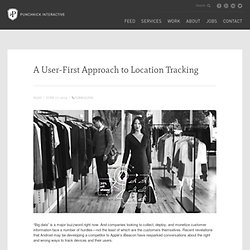
And companies looking to collect, deploy, and monetize customer information face a number of hurdles—not the least of which are the customers themselves. Recent revelations that Android may be developing a competitor to Apple’s iBeacon have resparked conversations about the right and wrong ways to track devices and their users. Generally speaking, people simply don’t like the idea of companies tracking their location, nor their phones automatically activating various sensors just because they happen to be in the general vicinity of another device’s sensors.
In fact, a recent report by Consumer Action found that only 26% of consumers believe online marketers “consider your privacy when you are online.” When considering a mobile marketing strategy that utilizes location tracking, a series of user-centric factors should be evaluated before diving in. For many consumers, no technology is more personal than mobile. It’s Complicated: Facebook’s History of Tracking You. For years people have noticed a funny thing about Facebook's ubiquitous Like button. It has been sending data to Facebook tracking the sites you visit. Each time details of the tracking were revealed, Facebook promised that it wasn't using the data for any commercial purposes. United States of Secrets. How AT&T Helped the NSA Spy on Millions August 17, 2015, 4:23 pm ET · by Jason M. Breslow A new investigation finds that the NSA’s relationship with the nation’s second biggest wireless carrier was “unique and especially productive.”
With or Without the Patriot Act, Here’s How the NSA Can Still Spy on Americans June 1, 2015, 4:03 pm ET · by Jason M. Timeline of Edward Snowden's revelations. How One Woman Hid Her Pregnancy From Big Data. All sent and received e-mails in Gmail will be analyzed, says Google. Google added a paragraph to its terms of service as of Monday to tell customers that, yes, it does scan e-mail content for advertising and customized search results, among other reasons. The Conversation: Lawrence Lessig by Smiley and West. How advertising cookies let observers follow you across the web. Back in December, documents revealed the NSA had been using Google's ad-tracking cookies to follow browsers across the web, effectively coopting ad networks into surveillance networks.
A new paper from computer scientists at Princeton breaks down exactly how easy it is, even without the resources and access of the NSA. The researchers were able to reconstuct as much as 90% of a user's web activity just from monitoring traffic to ad-trackers like Google's DoubleClick. Crucially, the researchers didn't need any special access to the ad data. They just sat back and watched public traffic across the network. What the Proposed NSA Reforms Wouldn’t Do. Ten months after Edward Snowden's first disclosures, three main legislative proposals have emerged for surveillance reform: one from President Obama, one from the House Intelligence Committee, and one proposal favored by civil libertarians.
If There's Privacy In The Digital Age, It Has A New Definition : All Tech Considered. An MIT Project That Lets You Spy On Yourself : Planet Money. NSA uses Google cookies to pinpoint targets for hacking. Microsoft, suspecting NSA spying, to ramp up efforts to encrypt its Internet traffic. No Warrant, No Problem: How the Government Can Get Your Digital Data. America on NSA Spy Programs: Meh. Edward Snowden: the whistleblower behind the NSA surveillance revelations. The individual responsible for one of the most significant leaks in US political history is Edward Snowden, a 29-year-old former technical assistant for the CIA and current employee of the defence contractor Booz Allen Hamilton. Snowden has been working at the National Security Agency for the last four years as an employee of various outside contractors, including Booz Allen and Dell. Revealed: how US and UK spy agencies defeat internet privacy and security.
US and British intelligence agencies have successfully cracked much of the online encryption relied upon by hundreds of millions of people to protect the privacy of their personal data, online transactions and emails, according to top-secret documents revealed by former contractor Edward Snowden. The files show that the National Security Agency and its UK counterpart GCHQ have broadly compromised the guarantees that internet companies have given consumers to reassure them that their communications, online banking and medical records would be indecipherable to criminals or governments.
The NSA files. How Companies Learn Your Secrets. Alleged subway 'Peeping Mike' appeals before Massachusetts SJC. Now Facebook Can See Inside Your Heart, Too. Political Cartoon by Terry Wise, Ratland Ink Press - 09/24. N.S.A. Gathers Data on Social Connections of U.S. Citizens. Privacy Scandal: NSA Can Spy on Smart Phone Data. Revealed: How US and UK spy agencies defeat internet privacy and security. Stacey Vanek Smith, this is your data profile. Edward Snowden's not the story. The fate of the internet is.
The Surveillance-Free Day (Part I) America on NSA Spy Programs: Meh. White House Defends Phone-Record Tracking as 'Critical Tool' Why I'm quitting Facebook. Google Keeps Giving Government Your E-mails. Dept. of Homeland Security Forced to Release List of Keywords Used to Monitor Social Networking Sites. Why Freak Out About Instagram Privacy? British Police Arrest Journalist at The Sun, a Murdoch Paper. Meet The Numerati. Decoding Our Twitter Chatter.